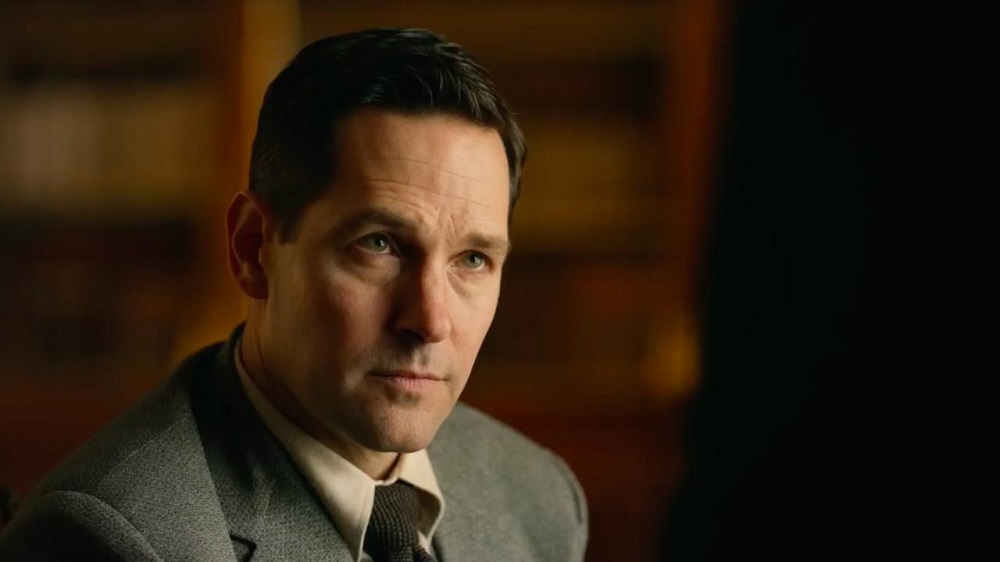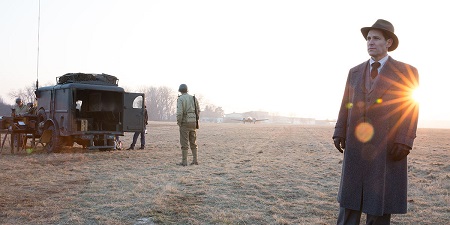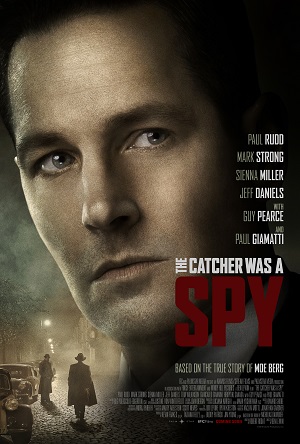
Imperfect Spy Still Catches the Viewer’s Attention
Catcher Morris “Moe” Berg (Paul Rudd) played 15 years of professional baseball, winding up his career with the Boston Red Sox in 1939. A man of many mysteries, the journeyman athlete was a graduate of Princeton University and Columbia Law School, read up to ten newspapers in a day, spoke a variety of languages and was a popular guest on the television quiz program “Information, Please.” Berg was also a spy working for the Office of Strategic Services (OSS) during WWII, analyzing what was happening inside of Germany and Japan for the U.S. government throughout the war.
It is now 1944. OSS Chief “Wild Bill” Donovan (Jeff Daniels) has a new assignment for Berg. Under the guidance of U.S. military specialist Robert Furman (Guy Pearce) and Dutch-American physicist Samuel Goudsmit (Paul Giamatti), the former Red Sox catcher must hunt down German theoretical physicist Werner Heisenberg (Mark Strong) and determine if he intends to build an atomic bomb. After meeting with Italian physicist Professor Eduardo Amaldi (Giancarlo Giannini) to learn more about his target and gaining assistance from Swiss physicist Paul Scherrer (Tom Wilkinson) and a cagey OSS spy named Martinuzzi (Pierfrancesco Favino) stationed in Switzerland, Berg prepares to meet with his target face to face, knowing that it’s possible the entire outcome of the war will come down to whether or not he allows Heisenberg to walk away from their conversation alive.
The story fueling The Catcher Was a Spy is undeniably fascinating. Berg is one of the more mysteriously enigmatic figures of the 20th century, and for anyone who has read author Nicholas Dawidoff’s best-selling book that screenwriter Robert Rodat (Saving Private Ryan) based his screenplay on, it’s safe to say there’s enough material here for a six-part miniseries let alone one, just barely 90-minute star-studded thriller. It’s almost too much of a dramatic obstacle for director Ben Lewin (The Sessions) to be able to overcome, so much about this character an indecipherable conundrum. But thanks to the stellar cast (which also includes Sienna Miller, Hiroyuki Sanada, Shea Whigham and Connie Nielsen) and a charismatically multifaceted performance from Rudd that’s superb, the movie works far better than it arguably should, the haunting minimalistic beauty of the final 20 minutes particularly so.
Not to say Lewin’s opus still doesn’t bite down on far more than it can easily chew. The relationship between Berg and his longtime girlfriend/lover Estella Huni is notable mainly because of the passionately intense performance delivered by Miller. Even with that being the case, there isn’t enough time to dive into the complexities of the pair’s romance. Berg works overtime to keep their affair secret even though his devotion to Huni is painfully obvious. It’s undeniably doomed, this romance, yet the reasons making it so remain frustratingly ephemeral, and while I get that painting things in this fashion allows Lewin and Rodat the freedom to keep their spy an enigma, it also means a bit of his humanity sadly gets lost in the process.
The movie works best when it focuses directly on its central plot, and that’s Berg putting all the pieces together so he can properly assess Heisenberg and make the decision whether or not to assassinate him. There is a noticeable tension whenever Lewin puts that part of the story front and center, and whether he’s having theoretical discussions with Goudsmit or going over the mechanics of killing another human being with Martinuzzi moments like these substantially add to the suspense quotient. It should be noted that both Daniels and especially Giamatti are excellent in their supporting roles, and for a motion picture that has name stars popping in and out constantly for what can only be described as glorified cameos, the fact each actor makes the most out of every one of the scenes they appear in isn’t to be taken for granted.
But this is Rudd’s show and he rises to the occasion. There is something to be said about the professorial, almost emotion-free way the actor portrays Berg, conceptualizing his hesitancy to reveal too much about his massive intellect or Jewish upbringing in ways that are inflexibly intriguing. This is about as far from any past characters Rudd has portrayed in his entire career, the Ant-Man star eschewing his typical comedic and satirical ticks and tricks with complex aplomb. There is an emotional richness to this portrayal that slowly snuck up on me, all of which helps give the final minutes of this story a lingering eloquence that took me by surprise.
The jumps between dramatic relationship bits involving Huni, to sequences of the ballplayer touring Japan with other MLB stars like Babe Ruth (clandestinely taking pictures of potential sites of military interest entirely of his own accord while there), to hushed conversation with Donovan, to full-on battlefield pyrotechnics showcasing Berg, Furman and Goudsmit dodging bullets and bombs in an effort to track down Amaldi, these many transitions don’t always work. There is a messiness in tone and style that results in narrative inconsistencies that do grow obnoxious, and as such it’s hard not feel like Rodat’s screenplay should have been given more time to evolve and breathe in order for these transitions to become more authentically organic instead of being choppily incoherent.
But the emotional core to Berg’s story is sound. Rodat has composed a number of little vignettes that are compelling in their emotional breadth and informative scope. Coupled with Rudd’s aforementioned strong performance as well as the film’s intimately crackerjack climax, there is a perceptive humanity to Lewin’s latest that cannot be denied. The Catcher Was a Spy is an imperfect examination of a curiously complicated figure in American history, and even if many viewers will feel compelled to do additional research into Berg after watching (or, at the very least, pick up a copy of Dawidoff’s book) that doesn’t mean the film itself still isn’t worth taking the time to see.
Film Rating: 2½ (out of 4)








